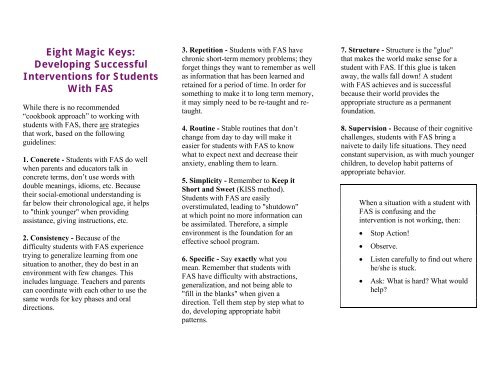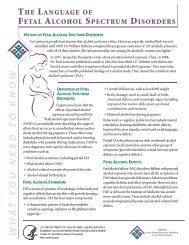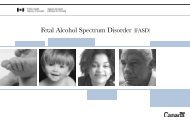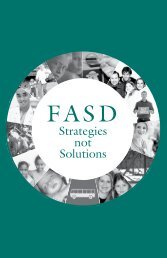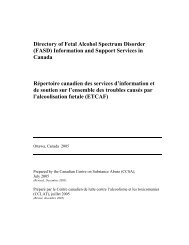Eight Magic Keys - FASD Center for Excellence
Eight Magic Keys - FASD Center for Excellence
Eight Magic Keys - FASD Center for Excellence
You also want an ePaper? Increase the reach of your titles
YUMPU automatically turns print PDFs into web optimized ePapers that Google loves.
<strong>Eight</strong> <strong>Magic</strong> <strong>Keys</strong>:<br />
Developing Successful<br />
Interventions <strong>for</strong> Students<br />
With FAS<br />
While there is no recommended<br />
“cookbook approach” to working with<br />
students with FAS, there are strategies<br />
that work, based on the following<br />
guidelines:<br />
1. Concrete - Students with FAS do well<br />
when parents and educators talk in<br />
concrete terms, don’t use words with<br />
double meanings, idioms, etc. Because<br />
their social-emotional understanding is<br />
far below their chronological age, it helps<br />
to "think younger" when providing<br />
assistance, giving instructions, etc.<br />
2. Consistency - Because of the<br />
difficulty students with FAS experience<br />
trying to generalize learning from one<br />
situation to another, they do best in an<br />
environment with few changes. This<br />
includes language. Teachers and parents<br />
can coordinate with each other to use the<br />
same words <strong>for</strong> key phases and oral<br />
directions.<br />
3. Repetition - Students with FAS have<br />
chronic short-term memory problems; they<br />
<strong>for</strong>get things they want to remember as well<br />
as in<strong>for</strong>mation that has been learned and<br />
retained <strong>for</strong> a period of time. In order <strong>for</strong><br />
something to make it to long term memory,<br />
it may simply need to be re-taught and retaught.<br />
4. Routine - Stable routines that don’t<br />
change from day to day will make it<br />
easier <strong>for</strong> students with FAS to know<br />
what to expect next and decrease their<br />
anxiety, enabling them to learn.<br />
5. Simplicity - Remember to Keep it<br />
Short and Sweet (KISS method).<br />
Students with FAS are easily<br />
overstimulated, leading to "shutdown"<br />
at which point no more in<strong>for</strong>mation can<br />
be assimilated. There<strong>for</strong>e, a simple<br />
environment is the foundation <strong>for</strong> an<br />
effective school program.<br />
6. Specific - Say exactly what you<br />
mean. Remember that students with<br />
FAS have difficulty with abstractions,<br />
generalization, and not being able to<br />
"fill in the blanks" when given a<br />
direction. Tell them step by step what to<br />
do, developing appropriate habit<br />
patterns.<br />
7. Structure - Structure is the "glue"<br />
that makes the world make sense <strong>for</strong> a<br />
student with FAS. If this glue is taken<br />
away, the walls fall down! A student<br />
with FAS achieves and is successful<br />
because their world provides the<br />
appropriate structure as a permanent<br />
foundation.<br />
8. Supervision - Because of their cognitive<br />
challenges, students with FAS bring a<br />
naivete to daily life situations. They need<br />
constant supervision, as with much younger<br />
children, to develop habit patterns of<br />
appropriate behavior.<br />
When a situation with a student with<br />
FAS is confusing and the<br />
intervention is not working, then:<br />
• Stop Action!<br />
• Observe.<br />
• Listen carefully to find out where<br />
he/she is stuck.<br />
• Ask: What is hard What would<br />
help
<strong>Eight</strong> <strong>Magic</strong> <strong>Keys</strong>:<br />
Developing Successful<br />
Interventions <strong>for</strong><br />
Students With FAS<br />
1. Concrete<br />
2. Consistency<br />
3. Repetition<br />
4. Routine<br />
5. Simplicity<br />
6. Specific<br />
7. Structure<br />
8. Supervision<br />
<strong>FASD</strong> in a Nutshell<br />
■ Fetal alcohol spectrum<br />
disorders (<strong>FASD</strong>) refers to<br />
FAS and other alcoholrelated<br />
birth defects.<br />
■ <strong>FASD</strong> is the leading known<br />
cause of mental retardation.<br />
■ Most people with <strong>FASD</strong> test<br />
higher on an IQ test than they<br />
are capable of functioning in<br />
real life.<br />
■ <strong>FASD</strong> causes serious social<br />
and behavior problems.<br />
■ Each year in the US 40,000<br />
babies are born with <strong>FASD</strong>.<br />
■ No amount of alcohol is<br />
known to be safe during<br />
pregnancy.<br />
■ Alcohol causes more damage<br />
to a baby than any other drug.<br />
■ <strong>FASD</strong> is 100% preventable.<br />
Fetal Alcohol Syndrome<br />
Based on Fasstar In<strong>for</strong>mation Series Brochure<br />
1200MK1<br />
<strong>Eight</strong> <strong>Magic</strong> <strong>Keys</strong>:<br />
Developing Successful<br />
Interventions <strong>for</strong> Students<br />
With FAS<br />
Fasalaska Project FACTS (Fetal Alcohol<br />
Consultation and Training Services)<br />
Developed by<br />
Deb Evensen and Jan Lutke 1997<br />
Used with permission<br />
fascenter.samhsa.gov<br />
866-STOP-FAS (786-7327)


